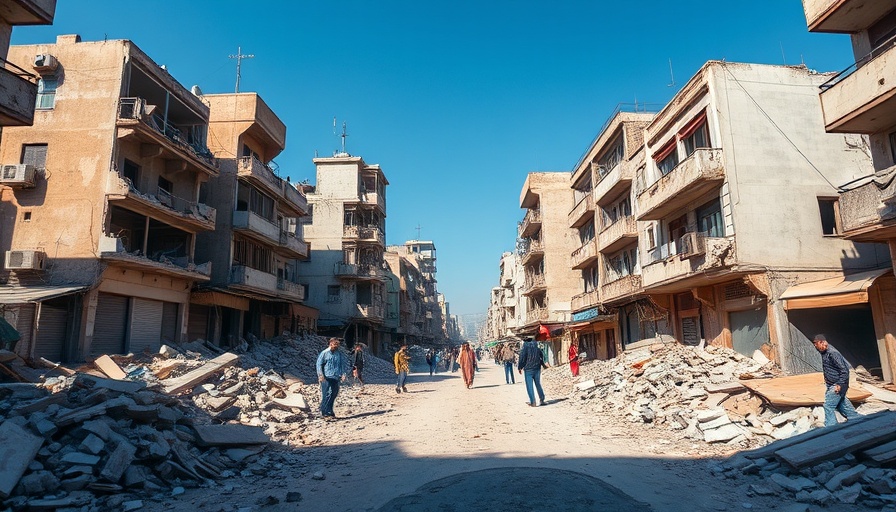
The Escalating Toll on Gaza’s Healthcare System
The situation in Gaza's healthcare sector has reached a breaking point, reflected vividly in the tragic scene at the Kuwait Specialty Field Hospital in Khan Younis. Earlier this week, an Israeli airstrike killed a security guard and wounded ten patients in what doctors are calling an impossibly tense reality for medical professionals. This incident follows closely on the heels of another strike just days prior, which hit the Ahli Arab Hospital, a vital part of the Palestinian medical landscape. Such strikes underscore a deeper concern: the erosion of healthcare during ongoing military conflict.
Understanding the Impact of War on Health Services
The heavy bombardment of medical facilities has left the healthcare system in Gaza teetering on the edge of collapse. Both strikes reveal the alarming frequency of attacks on hospitals, which are meant to be safe havens. Each incident not only inflicts immediate injuries but also breeds fear and mistrust among patients and healthcare workers. Reports from Dr. Suhaib al-Hamss, the hospital director, convey the anxiety that grips patients and staff alike. Operating a hospital under such conditions becomes a daunting challenge.
Civilian Casualties: A Cost of Conflict
The Israeli military justified its recent bombardments by alleging links between medical facilities and Hamas activities, claiming to target command centers. However, as the toll on civilian lives rises—where guards and patients alike find themselves caught in crossfire—the question arises: how justifiable is this collateral damage? Witness accounts from patients fleeing the Kuwait field hospital reveal the terror embedded in their daily existence. Mohammed Abu Ghali from HEAL Palestine describes a moment of sheer panic following the strike, illuminating the human dimension behind the statistics.
Reactions from the International Community
The international response to the deteriorating situation in Gaza is mixed. While humanitarian organizations call for immediate assistance and an end to hostilities, nations remain divided. Some governments continue to support Israel’s right to defend itself, while others denounce the attacks on civilian infrastructure, including healthcare facilities. The silence and inaction from many global players increasingly draw scrutiny as the humanitarian crisis escalates.
Future Predictions: A Hopeful Path?
As the conflict continues, the future of Gaza’s healthcare system looks bleak. Health professionals express fears that without a ceasefire and proper support, the already fragile facilities will fail altogether. However, there are signs of resilience among local organizations that strive to provide medical aid. Initiatives like HEAL Palestine focus on rebuilding and supporting the health sector, which might help in the long term, but immediate intervention is critical. Could international aid provide the lifeline that may allow for recovery?
Community Voices: The Human Side of Conflict
Voices from the ground tell stories of not just suffering but also strength and solidarity. The ability of healthcare workers to continue their mission under such circumstances draws admiration. Families come together, sharing resources, and showing remarkable resilience. The community’s commitment to supporting healthcare measures, even amid chaos, creates a glimmer of hope. As we reflect on the gravity of their situation, let us also celebrate their bravery.
The Importance of Awareness and Advocacy
Raising awareness about the plight of healthcare facilities in conflict zones like Gaza is essential. Readers can play a part by sharing these stories, advocating for humanitarian aid, and supporting organizations that provide medical assistance. Understanding these dynamics encourages informed discussions about the consequences of war, especially on the civilian population. Advocacy can lead to pressure on governments to prioritize humanitarian responses.
In conclusion, the healthcare crisis in Gaza highlights the urgent need to protect medical facilities in conflict zones. By bringing awareness to the plight of communities affected by warfare, we can contribute to a global dialogue aimed at reducing the humanitarian toll. Together, we can push for solutions that address the immediate needs and secure a better future for all civilians caught in the crossfire.
 Add Row
Add Row  Add
Add 




 Add Row
Add Row  Add
Add 

Write A Comment